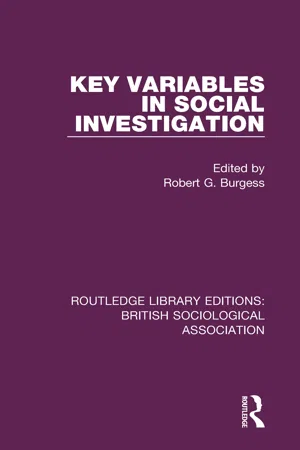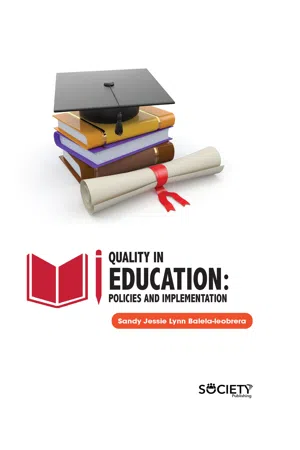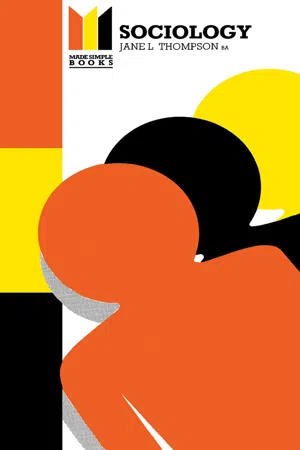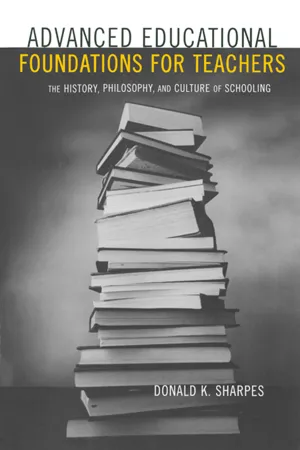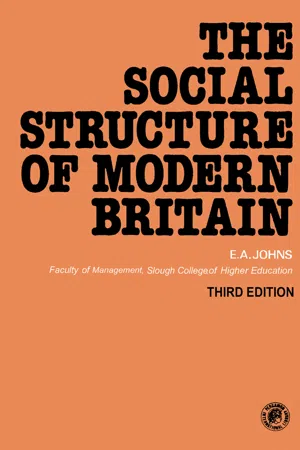Social Sciences
Education in UK
Education in the UK encompasses a diverse system that includes early years, primary, secondary, further, and higher education. It is overseen by the government and aims to provide a well-rounded education to students, focusing on academic, social, and personal development. The system also includes vocational and technical education pathways to cater to a range of student needs and aspirations.
Written by Perlego with AI-assistance
Related key terms
1 of 5
9 Key excerpts on "Education in UK"
- eBook - ePub
- Robert Burgess(Author)
- 2018(Publication Date)
- Routledge(Publisher)
6Education *
Robert G. BurgessAlthough there is a vast literature on ‘education’ and the ‘sociology of education’ it appears that researchers are far from clear as to what counts as ‘education’ and the ‘educational process’. A brief glance at a range of basic texts devoted to social science and educational studies indicates that the term ‘education’ is often ill-defined and used to apply to a narrow range of social circumstances. Despite the fact that ‘education’ is a life-long experience that can be acquired through the family, the peer group, the church, the trade union, the workplace and so on, it is often the case that education is equated with schools, colleges, classrooms, curricula and examinations. In these circumstances, we need to consider how researchers have defined ‘education’ and for what purpose. This chapter therefore focuses on the way in which ‘education’ has been defined within major areas of the sociology of education. As ‘education’ is in part defined by social legislation there are numerous differences between the structure of the educational systems of different societies and in turn this influences the ways in which researchers define ‘education’. Accordingly, much of the discussion provided in this chapter together with examples of empirical evidence will be drawn from the United Kingdom and in particular from the English educational system.Education as an area of study
As a recent review of social science and educational studies by Hartnett (1982) indicates, ‘education’ is the subject of research by anthropologists, psychologists, historians and philosophers as well as sociologists. Indeed, the field of study is one in which researchers have applied their disciplines to ‘education’. Among sociologists this has resulted in a preoccupation with the policy concerns of governments and the professional problems of educators (cf. Young, 1971; Karabel and Halsey, 1977). Nowhere is this more apparent than in Britain where Bernstein (1974) has argued that the sociology of education in the immediate post-second world war period ‘bore the hallmarks of British applied sociology; atheóretical, pragmatic, descriptive and policy focussed’ (1974, p. 149). Such an approach, as Archer (1981) has commented, overlooks the contribution that Weber, Marx and particularly Durkheim made to the study of education as a social institution. While she acknowledges that education was never a major field of study for Marx and Weber, she argues that with Durkheim they developed a common orientation to this area by treating education as a macroscopic social institution, by placing the educational institution in the wider social structure and by focusing on education, social structure and other social institutions in examining the dynamics of educational change. Archer considers that from this tradition a sociology of educational systems can be developed (cf. Archer, 1979), but this has been a minority interest in sociology (Banks, 1982). Accordingly, we need to ask: what constitutes the sociological study of education? How is ‘education’ defined? How have researchers interpreted ‘education’ as a variable in social investigation? - eBook - PDF
Quality in Education
Policies and Implementation
- Sandy Jessie Lynn Balela Leobrera(Author)
- 2019(Publication Date)
- Society Publishing(Publisher)
In some professions, the lines are so blurred that it is not even possible to distinguish where one ends and the other begins (Lewis, 1996). Yet, there are some disciplines who specialities Introduction to the Meaning of Education 39 are so well-defined that they become distinct sub-professions in their own right (Lewis, 1996). The common broader disciplines include natural sciences, mathematics, computer science, social sciences, humanities and applied sciences. These can then be broken down to certain specialities such as education, medicine, architecture, law, social work, economics and fine art. As the curriculum development process has become more sophisticated, it has been possible to incorporate items that were traditionally ignored but are currently considered to be important to the development of a child. A case in point is where the K-12 curriculum may incorporate the fine arts, yet traditionally these were located at university and college level (Li, et al., 2010). It is generally believed that children should be given as rich an experience as possible which may include sports, dance, music and drama as part of the co-curricular activities (Li, et al., 2010). Indeed, the students that excel in such additional elements of the curriculum may be given scholarships to continue their education despite the fact that they may not necessarily be academically gifted (Sternberg, 2003). This allows for a wider mix of students that eventually get to the higher levels of education (Wilke & Straits, 2001). The curriculum is necessarily an empty document if it is not followed by specific instruction. This calls for an understanding of the way in which people learn as well as the impact of the learning process on them (Gil & Wakefield, 2015). Instruction has been defined as a form of facilitation that enables another person to learn. - eBook - PDF
Sociology
Made Simple
- Jane L. Thompson(Author)
- 2013(Publication Date)
- Made Simple(Publisher)
None of these is a natural or neutral operation, though. All of them are 'man-made' and reflect the accumulated attitudes and interests of those individuals and groups who, over a period of time, have been most closely responsible for formulating their philosophies, shaping their policies and directing and enacting their decisions. The indivi-duals and groups in question have tended historically to be those whom I referred to in Chapter 2 as the ruling class. But more of this later. The point to note here is that however important or effective the influence of these 'informal' educational agencies might be—for good or ill—these are not usually the experiences which are seriously considered and recognised when 'education' is being defined or discussed. 79 80 Sociology For most people education is what happens in schools and colleges and all the other easily identifiable institutions which are part and parcel of the education system. So far as sociologists are concerned, most of their attention has been focused on schoohng and related issues, as the only part of the education process which is both universal and compulsory. For this reason, most of what follows in this chapter will be concerned with the main aspects of the sociology of education as they relate to the organisation and experience of schoohng. The Historical Context Strange as it may seem, despite appeals to 'tradition' the experience of education for most people in Britain is a fairly recent development. The first real intervention by the state in the business of providing universal, free and compulsory schooling only really began to take effect towards the end of the last century. The history of the last hundred years has been one of conflicting views about the merits of different ways of organising schools, one of struggle to expand educa-tional provision and equalise educational opportunities and one of tension between the roles of education as an agency of social control and social change. - eBook - PDF
- Richard Pring(Author)
- 2010(Publication Date)
- Continuum(Publisher)
The meaning of 'education', therefore, might be characterized as follows: First, it refers to those activities which bring about learning. Hence, we talk about educational systems or institutions estab-lished with the specific purpose of getting people (particularly young people) to learn. Educational research, therefore, must focus upon learning. At the centre of learning lies the development of what Peters (1965) referred to as 'cognitive perspective' -those 14 Philosophy of Educational Research structures of the mind or conceptual framework through which experience is understood, organized and made sense of. Without a broader cognitive perspective (that is, with only a partial and limited vision), one would have a distorted perception of reality. Hence the complexity of educational research because it is not clear what, in every case, counts as a person having learnt or having understood something, let alone having attained the mental qualities which are educationally valued. Second, however, not any kind of learning is regarded as educational. 'Education' picks out those learning activities which are, from some point of view, regarded as worthwhile. (This point is disputed by, for example, Wilson, 1979, p. 27; but he does not pay sufficient attention to the idea of the 'educated person' both historically and in ordinary usage or political argument.) Of course, different people will have different views of what is worth learning, and thus of what counts as a 'good education' or an 'educated person'. And that creates complications for educational research -for example, in international comparisons of educational achieve-ment or in judgements about educational standards, because standards are logically related to the values held. For Dewey, worthwhile learning was that which was 'fruitful' in enabling people to adapt successfully to new situations and to identify (and deal with) problems as they arise. - eBook - PDF
Schools and Communities
Working together to transform children's lives
- John West-Burnham, Maggie Farrar, George Otero(Authors)
- 2007(Publication Date)
- Network Continuum Education(Publisher)
(Interestingly they are often in the same countries.) Education is a social activity defined by personal and social choices - it is therefore a moral activity. One of the problems of British education is that it is deeply rooted in a moral framework that is the antithesis to any notion of equity or democracy. The malevolent influence of Plato continues to dominate much of educational thinking however subliminal or massaged it may be. The idea of the gold standard, the justification of a stratified society and the control and censorship of education can all be directly attributed to Plato. Those who argue for the incompatibility of excellence 3 and equity are essentially perpetuating Plato's elitist and anti-democratic ideology. This chapter seeks to make the case for equity and social justice in education to underpin the case presented in Chapters 1 and 2. This chapter will therefore explore the following themes: • Comparing and contrasting education and schooling • The purpose of education • Childhood • Children's rights • Every Child Matters. Comparing and contrasting education and schooling 'When I use a word/ Humpty Dumpty said in a rather scornful tone, 'it means just what I choose it to mean -neither more nor less.' (Carroll, 1872, page 59) One of the key problems in approaching this topic is that education and schooling are frequently used interchangeably, if not as actual synonyms. However, it quickly becomes apparent that the Department for Education is in fact concerned with institutions, content and outcomes, and that the mantra 'education, education, education' in fact means 'schools, schools, schools'. For the purposes of this discussion, schooling is defined as the formalized, commodified and bureaucratized component of education; in essence: Schooling is a necessary but not sufficient component of education. During the period of compulsory schooling, children and young people spend about 15 per cent of their life in schools. - eBook - PDF
- W. H. Burston(Author)
- 2013(Publication Date)
- Bloomsbury Academic(Publisher)
If this alone is meant by education, it is no doubt true that education is very far indeed from being all-powerful. But if in education is included everything, which acts upon the being as it comes from the hand of nature, in such a manner as 1 Essay on Education, op. cit., pp. 41-2. POLITICAL AND SOCIAL EDUCATION 199 to modify the mind, to render the train of feelings different from what it would otherwise have been; the question is worthy of the most profound consideration.' 2 Mill does not commit himself to Helvetius' famous assertion: 'L'education peut tout', but he does say, on empirical grounds: 'This much, at any rate, is ascertained, that all the difference which exists, or can be made to exist, between one class of men, and another, is wholly owing to education.' 3 This definition enabled Mill to include under the term 'educa-tion' the influence of the family, both before and during school-days: this he entitled Domestic Education. More important from the point of view of this chapter is that he also extended the term education to apply after school-days, and throughout life and therefore arrived at concepts of Social and Political Education, or the influence of Society and of the State upon our characters and abilities. 'Social Education', says Mill, 'is that in which Society is the Institutor. That the Society in which an individual moves pro-duces great effects upon his mode of thinking and acting, every-body knows by indubitable experience. The object is, to ascer-tain the extent of this influence, the mode in which it is brought about, and hence the means of making it operate in a good, rather than an evil direction. 'The force of this influence springs from two sources: the principle of imitation; and the power of the society over our happiness and misery.' 4 The first of these is due to association and the frequency with which we are in the society of our personal group or groups. - eBook - ePub
Advanced Educational Foundations for Teachers
The History, Philosophy, and Culture of Schooling
- Donald K. Sharpes(Author)
- 2013(Publication Date)
- Routledge(Publisher)
1.Education and the Social SciencesOverview
Writing a textbook might seem like an act intended to discipline minds and to torment students. In this case, however, the endeavor fulfills a career objective of designing the ideal education course--one should not be considered complete without a text that embraces the principal social sciences for teachers. In this exchange of knowledge, the writer gladly suffers most, though students may think otherwise. I offer this text hopefully for your welcome consideration, professional advancement, and instructional enhancement.Intended for teachers and educators interested in the intellectual ideas that have significantly influenced educational theory and schooling practice, this text focuses on the historical, philosophical, and cultural foundations of American education and schooling broadly considered. Foundations, a topic that you likely studied in an undergraduate teacher education course, refers, in this advanced text to the relevant social sciences-history, philosophy, and culture--that have theoretical underpinnings and knowledge bases useful for understanding educational agendas, schooling objectives, and instructional practices. In this text I attempt to combine these social science studies for your professional educational development and your own intellectual stimulation with an expanded series of teaching applications and case studies adaptable to early childhood, elementary, and secondary classroom use.Tracing the history of schooling, or more relevantly the intellectual history of education, may seem like an ambitious quest for a single text. In my effort, I have synthesized its various disciplines and ideas into a theme by answering and unifying two rather straight-forward questions: Why have some ideas persisted in education and others have not, and who has benefitted from education? I have no illusions that I will actually answer these questions fully, only that I will identify for you a constellation of factors that will make it possible to draw reasonable conclusions about the ideas, figures, and features that significantly shaped education as we know it today. - eBook - PDF
- Will Gibson, Dirk vom Lehn(Authors)
- 2016(Publication Date)
- Bloomsbury Academic(Publisher)
88 5 Education Introduction Education institutions are some of society’s most powerful organs of socializations: aside from providing people with knowledge and skills they pro-duce social and cultural capital, access to job markets, and networks of friends and contacts that can stay with people through the entirety of their adult lives. This rather hyperbolic description is idealized in that it speaks about education as a set of ideals rather than a set of practices. Our interest in this chapter is in exploring the work that gets done in educational institutions such as kindergar-tens, schools, and universities, all of which are charged with organizing learning and teaching in some form or other. Formal education environments are not the only kind of institution that deal with learning, as many if not most institu-tions provide training to participants/employees, structure information for their members, and in this broad sense they can also be considered as sites of peda-gogy. Furthermore, learning, in the general sense of accumulating knowledge or developing understanding, is not only an institutional activity, as it can occur in all sorts of informal contexts such as conversations between friends and family or even in lone pursuits like reading or playing games. However, by their very nature of being ‘ institutions of education’, the sorts of environments we will be discussing here result in quite distinctive structures of activity and, as we shall see, their members face particular challenges. Education systems around the world are in many cases complex collections of educational programmes. - eBook - PDF
The Social Structure of Modern Britain
Pergamon International Library of Science, Technology, Engineering and Social Studies
- E. A. Johns(Author)
- 2016(Publication Date)
- Pergamon(Publisher)
T h u s the authors of Social Scientists at Work 25 conclude: W e have shown that possession of a social science degree entailed average earnings higher t h a n those for graduates as a whole d u r i n g the 1960s a n d we have suggested that this m a y h a v e accounted at least in p a r t for the rapid growth in the n u m b e r of social science students d u r i n g that d e c a d e . A r m e d with such assumptions, the study predicts that the proportion of sociologists will fall d u r i n g the next few years, followed to a certain extent by the n u m b e r of psychologists ; business studies courses will r e m a i n p o p u l a r ; the expansion of economics will continue ; a n d the decline in geography is perennial. 25 Williams, G., Westoby, A. and Webster, D., Social Scientists at Work, Society for Research into Higher Education, 1976. The Socialization Process : Education 167 Education and Society Socialization is a process of cultural transmission w h e r e b y people learn the rules, practices a n d n o r m s of the social groups to which they belong. F o r m a l education is only one of the m a n y a g e n c i e s 26 through which the socialization process is enacted, b u t it is particularly crucial in a d v a n c e d industrial societies because of the a m o u n t of time it occu-pies d u r i n g the individual's formative years. As education proceeds, a n d prolongs itself by the development of extensions to the system beyond the m i n i m u m leaving age, it produces recruits for the specialized roles required b y industrialization. Equally, education communicates in-formal values which are eventually internalized by the recipient, on aspects of behaviour concerned with occupational a d v a n c e m e n t , honesty, individual competitiveness a n d others.
Index pages curate the most relevant extracts from our library of academic textbooks. They’ve been created using an in-house natural language model (NLM), each adding context and meaning to key research topics.
